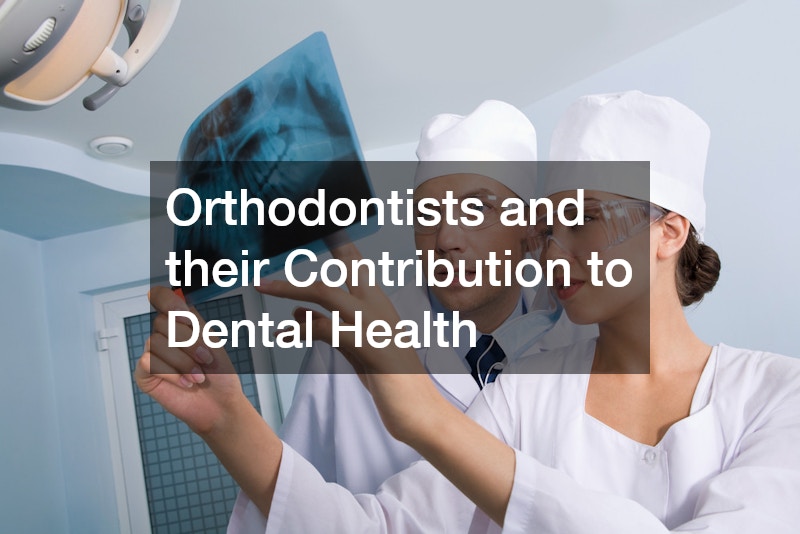
Crown Specialist and Other Types of Dentists You Should Know About

When it comes to oral health, most people think of dental offices for their regular checkups and cleanings. However, the field of dentistry is much broader than many realize, encompassing a diverse range of specialized professionals who focus on different aspects of oral care. These specialists play vital roles in addressing a wide array of dental needs, from maintaining healthy gums to restoring damaged teeth or enhancing the appearance of your smile. Their expertise ensures that patients receive targeted and effective treatments tailored to their specific concerns.
Understanding the roles of these specialists is key to taking proactive control of your oral health. For example, while a general dentist provides routine checkups and preventive care, a crown specialist focuses on restoring teeth that are damaged or decayed, ensuring they function properly and look natural. Orthodontists are experts in correcting misaligned teeth and bites, while cosmetic dentists concentrate on creating aesthetically pleasing smiles.
Knowing when and why to consult these professionals can greatly impact the success of your treatment and overall dental health. Whether you’re dealing with alignment issues, looking to improve your smile, or addressing specific conditions like sleep apnea or gum disease, the right specialist can make all the difference. Dental specialists not only offer solutions for existing problems but also work to prevent future issues, promoting a lifetime of oral health.
In this guide, we will explore the various types of dental specialists, their unique areas of expertise, and the procedures they commonly perform. By understanding the roles of these professionals, you’ll be better equipped to make informed decisions, ensuring that your dental care is as effective and comprehensive as possible.
What are Crown Specialists?
A crown specialist is a dental professional who focuses on restorative procedures that involve dental crowns. Crowns are custom-made caps that cover damaged or decayed teeth to restore their shape, size, and function. If you have suffered from a cracked tooth, severe decay, or need to protect a weakened tooth, a crown specialist can provide the expertise needed to restore your smile.
A crown specialist uses advanced techniques and materials to ensure your crown fits seamlessly with your natural teeth. They work closely with general dentists and other specialists to provide comprehensive care. Crowns can also be part of more extensive restorative treatments, such as dental implants or bridges. Their ability to restore both the aesthetics and functionality of teeth makes them a crucial resource for anyone requiring advanced dental care.
Cosmetic Dentistry: Enhancing Your Smile
A cosmetic dentist focuses on improving the appearance of your teeth and smile. Popular procedures include teeth whitening, veneers, and bonding. Veneers, for instance, are thin shells placed over the front of your teeth to correct imperfections like discoloration or minor misalignments.
Cosmetic dentistry often overlaps with the work of a crown specialist. For example, a patient seeking a smile makeover might require both veneers and crowns to achieve their desired look. The collaboration between these specialists ensures both aesthetic and functional outcomes.
The Foundation of Oral Health
Periodontics is a specialized field of dentistry that focuses on the health of the supporting structures of teeth, including gums and bones. Periodontists play a vital role in treating gum diseases such as gingivitis and periodontitis, which can lead to severe oral health issues, including tooth loss if it is left untreated. By addressing these conditions, periodontists contribute not only to oral health but also to overall well-being, as gum health is closely linked to systemic health concerns like heart disease and diabetes.
Periodontists often collaborate with a crown specialist when gum and bone health are critical to the success of dental restorations. Healthy gums and a stable bone structure are essential for the proper placement and longevity of crowns, veneers, and other dental restorations. This partnership ensures comprehensive care, combining gum treatment with restorative procedures for optimal results.
For patients with advanced periodontal issues, a coordinated approach involving both periodontists and a crown specialist is crucial. This teamwork helps rehabilitate oral health, preventing complications and supporting the long-term durability of dental restorations. Whether addressing gum disease or preparing the foundation for crowns, periodontics is an indispensable part of holistic dental care, ensuring patients achieve both functional and aesthetic outcomes.
Orthodontists and their Contribution to Dental Health
Orthodontists specialize in diagnosing and treating dental and facial irregularities, focusing on the alignment of teeth and the overall structure of the jaw. They address issues such as crowding, spacing, and bite problems using devices like braces, clear aligners, and retainers. Their expertise ensures functional bites, improved aesthetics, and long-term oral health.
While a crown specialist repairs and restores individual teeth, an orthodontist ensures that teeth are properly positioned, creating a harmonious foundation for restorative work. Collaboration between these specialists is common, particularly when misaligned teeth impact the placement or durability of crowns and other dental devices. Proper alignment enhances the function and longevity of restorations.
In addition to aesthetics, well-aligned teeth contribute significantly to oral health by facilitating easier cleaning and reducing the risk of plaque build-up and gum disease. Orthodontists play a vital, complementary role in comprehensive dental care, working alongside a crown specialist and other professionals to create healthy, lasting smiles.
Caring for Young Smiles
Pediatric dentists focus exclusively on the dental care of infants, children, and adolescents, addressing their unique developmental needs. With specialized training in child psychology and behavior management, they create a welcoming and stress-free environment, ensuring that young patients feel comfortable and at ease during dental visits. From routine cleanings and fluoride treatments to more complex procedures, pediatric dentists play a critical role in maintaining children’s oral health.
Early dental care is vital for identifying potential issues before they develop into more serious problems. Pediatric dentists often emphasize preventive care, teaching children and parents the importance of proper brushing, flossing, and dietary habits. In cases where advanced treatments like crowns are necessary, pediatric dentists frequently collaborate with a crown specialist to ensure the restorations are functional, durable, and suitable for a child’s growing teeth.
These professionals also address developmental concerns, such as thumb-sucking, teething, or issues related to the eruption of permanent teeth. By fostering positive dental experiences, pediatric dentists help children build trust and confidence in dental care, setting the stage for a lifetime of good oral health practices. Their role is instrumental in shaping young patients’ attitudes toward dental care, ensuring that preventive and restorative treatments are both effective and tailored to a child’s evolving needs.
The Role of An Apnea Dentist
Sleep apnea dentists focus on diagnosing and treating sleep disorders caused by structural issues in the oral and maxillofacial region, such as obstructive sleep apnea (OSA). This condition occurs when the airway becomes partially or completely blocked during sleep, leading to interruptions in breathing. Sleep apnea dentists provide non-invasive solutions, often designing custom-fit oral appliances to help maintain open airways and ensure uninterrupted sleep.
These appliances, similar to mouthguards, work by repositioning the jaw and tongue to prevent airway obstruction. The expertise of a sleep apnea dentist is particularly valuable for patients who cannot tolerate continuous positive airway pressure (CPAP) machines. They offer a comfortable and effective alternative to manage sleep apnea and improve overall quality of life.
Collaboration with other dental specialists, including a crown specialist, is sometimes necessary to ensure oral appliances fit seamlessly around crowns, veneers, or other dental restorations. A sleep apnea dentist ensures that treatments for sleep disorders do not compromise the integrity of existing dental work or the patient’s comfort.
Proper management of sleep apnea has far-reaching benefits, including improved cardiovascular health, reduced daytime fatigue, and enhanced mental clarity. By addressing this critical aspect of health, sleep apnea dentists contribute not only to oral wellness but also to a patient’s overall well-being.
Family Dentist: Your Partner in Oral Health
Your local family dentist serves as the primary dental care provider, offering a wide range of services from preventive dentistry to minor restorative procedures. They are the first point of contact for most dental concerns and play a vital role in maintaining dental health through regular check-ups and treatments.
A family dentist often coordinates care with a crown specialist and other dental professionals to ensure comprehensive treatment. This includes referrals when advanced procedures like dental crowns or orthodontics are needed, making them an integral part of a holistic dental care plan.
Building a relationship with a family dentist can lead to better personalization of care. Understanding the patient’s history and specific needs enables these dental professionals to provide tailored recommendations and proactively manage oral health.
A general dentist is often the first point of contact for dental care. They provide routine checkups, cleanings, and basic restorative treatments like fillings. General dentists are trained to diagnose and treat a wide range of dental issues. If your dental needs require specialized care, they will refer you to a crown specialist, orthodontist, or another appropriate professional.
General dentists also play a crucial role in preventive care. Regular visits to your local family dentist can help identify issues early, ensuring timely intervention and minimizing the need for more complex procedures later on.
The Integration of Advanced Technology in Dentistry
Advancements in technology have transformed modern dentistry, with laser dentistry leading the charge in precision, efficiency, and patient comfort. Lasers are now commonly used across various dental specialties, providing minimally invasive alternatives to traditional tools for a range of procedures. These innovations reduce healing time, minimize discomfort, and often eliminate the need for anesthesia, making them a preferred option for both patients and practitioners.
Crown specialists, cosmetic dentists, and periodontists frequently incorporate laser dentistry into their practices to enhance the precision and effectiveness of their treatments. For example, lasers are invaluable for soft-tissue contouring around crowns, ensuring an optimal fit while achieving a natural and aesthetically pleasing appearance. Additionally, lasers can assist in treating gum disease, reshaping gum lines, and even performing biopsies with greater accuracy and less discomfort.
The integration of laser technology highlights the continuous evolution of dental care, offering solutions that cater to modern patients’ needs for convenience and comfort. These advancements not only improve treatment outcomes but also elevate the overall patient experience, fostering trust and satisfaction. As laser dentistry continues to evolve, it promises even more groundbreaking innovations, ensuring that dental care remains at the cutting edge of science and technology for years to come.
The Importance of Understanding Dental Specialties
Understanding the various types of dental specialists, including a crown specialist, is essential for making informed decisions about your oral health care. Each dental professional offers unique expertise, catering to specific aspects of oral health and ensuring that patients receive the most appropriate care for their needs. Whether you require the restorative skills of a crown specialist, the aesthetic improvements of a cosmetic dentist, or the expertise of a sleep apnea dentist to address breathing issues, knowing the roles of these specialists empowers you to take charge of your oral health journey.
For routine dental maintenance, a local family dentist often serves as the first point of contact, providing regular checkups, cleanings, and preventive care. However, when more specialized attention is required—such as correcting misaligned teeth with an orthodontist, addressing gum health with a periodontist, or creating custom veneers to enhance your smile—a network of dental professionals works together to ensure your comprehensive care. This collaborative approach fosters a seamless transition between general dentistry and specialized treatments, allowing for tailored solutions to meet individual needs.
Advances in dental technology, such as laser dentistry and innovative imaging tools, have further enhanced the capabilities of these specialists, offering patients faster, more effective, and less invasive treatment options. By understanding the roles of dental specialists and staying informed about emerging techniques, you can actively participate in your oral health care and make choices that align with your goals. With a thorough understanding of the specialists available to you, you’ll be better equipped to address challenges, maintain optimal dental health, and achieve a beautiful smile. Taking a proactive approach and seeking the right expertise can make all the difference in your overall oral health and confidence.




